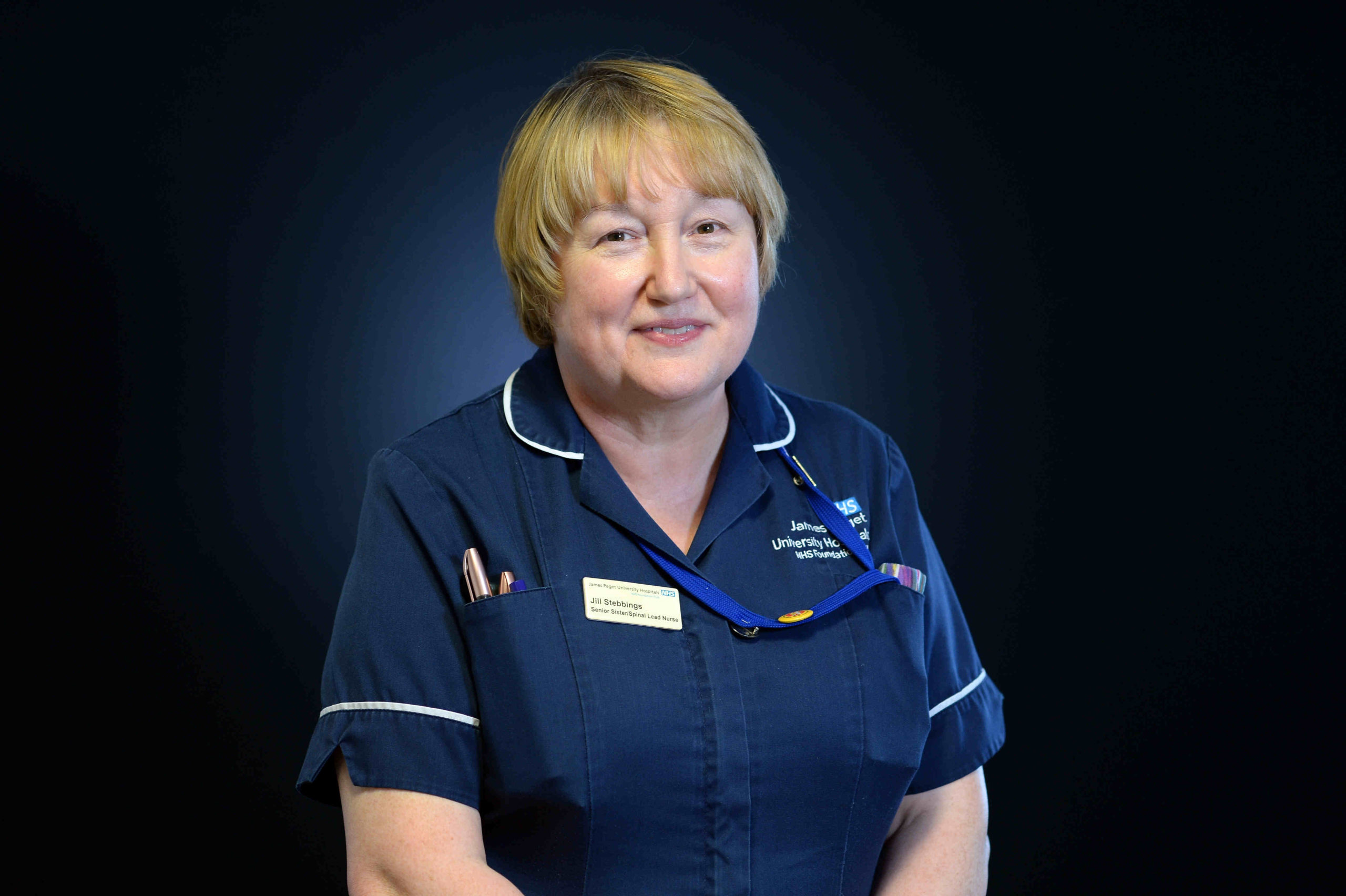Case Studies
Ever wondered what it would be like to work in one of our teams? Find out about some of our amazing staff and services.

Jill
James Paget University Hospital
How did you begin your career working in Health and Social Care?
A long time ago when Florence was still alive. I trained as a Nurse at the old NNUH. At that present time there were no student nurses in the Gt Yarmouth and Waveney area, so when I was awaiting results I was sent as a third year to the James Paget Hospital which at that time had been opened about 9 months. I was allocated an orthopaedic ward. I had never experience orthopaedics in my training, but I took to it like a duck to water and realised this was home and where I wanted to be.
I experienced 2 good things in life at this time, firstly I passed my nursing and became a SRN state registered nurse, RGN now days, and there was a registered nurse vacancy on the orthopaedic trauma ward. I had already applied for a job at JPUH so I went and saw the Director of Nursing, as you could do in those days and asked her if I could have the job on orthopaedic trauma to which she said yes.
So began my long career in orthopaedics. I had a break when I had my children and had a couple of years in the community which was easier at the time for childcare issues but most of the time I have been in orthopaedics.
I have been able to complete my orthopaedic training in both elective and trauma and also complete my spinal training.
So at the end of my career as I retire in about 8 days I am the Senior Sister of an orthopaedic ward and Spinal Nurse for JPUH.
I have been very fortunate in my career that I have been able to achieve all that I ever wanted.
What are your day-to-day responsibilities in your job role?
I am a Senior Sister of an orthopaedic ward, my responsibilities are 30% clinical and 70% managerial.
So I can do the nursing bit looking after patients and the managing of the ward. I see any patient as an inpatient in the hospital if asked, with any spinal cord injury either from trauma or a disease process. I do the clinical part of the job, but I also manage my ward and that includes appraisals, sorting training, managing any untoward incidents, compliments and complaints, dealing with relatives, managing sickness levels amongst staff, monitoring annual leave. Completing yearly reports for my area on health and safety, manual handling, control of hazardous substances. Monthly reports on staffing levels, patient safety, infections, patient experience and budget, audits covering care, so lots of other things than nursing but related to patient safety, care and the well- being of my staff. I am assisted in this by my deputy, whose responsibilities are 70% clinical and 30% managerial, between us we are a team hopefully an effective one.
My ward includes Nurses, Rehabilitation Assistants, Physiotherapists, Occupational Therapists, Therapy Assistant Practitioners, Domestics, A Housekeeper and Ward Clerk. Of course the Doctors and Consultants as well. We all work together to provide an orthopaedic service for the community of Waveney and this part of Norfolk.
What skills have you developed during your career? E.g. further training, personal development, secondment opportunities?
Orthopaedic training based at UEA in trauma and elective orthopaedics and Spinal training based at LSBU in London and at the Royal National Orthopaedic Hospital in Stanmore in London.
I believe very strongly that all training must be a benefit to all for the good of the patient and the service, so I have always made it a policy to share what knowledge I have gained whether that is in orthopaedics or especially in regards to spinals. Spinal Cord injury is a specialty, it is not a common condition and for some reason and I do not know why, I have always had a heart for these patients. I feel they have been dealt a hard card in life and try my best when I come upon them to ensure that we are doing the right thing for them and by them, in this venture I have worked with the spinal services at NNUH and worked closely with the spinal cord injury centre at Sheffield which is the centre that covers us. I have worked with my Consultants and Senior Nurses to put forward a business case to purchase in 2014 a Nexus legacy bed which enables us to move our unstable spinal injuries or spinal cord injured patients safely.
I have developed links with SIA (Spinal Injuries Association) as they have a superb peer support scheme and buddy system which we have used for the newly injured. I’ve organised training days for spinals at JPUH which we have invited HCPs from outside the hospital to, involving, Beagle who provide collars and braces, SIA, Nexus who supplied our spinal bed and the Spinal Cord Injury centre at Sheffield. We were due to have one on April 7th, but due to covid that had to be cancelled, but I am hopeful that sometime next year we may be able to resurrect it.
Also I have written and adapted policies and guidelines relating to spinal cord injury for the Trust. I have taught spinal care throughout my time here linked in with orthopaedic care and managing of a ward environment.
What do you most enjoy about your current job role?
I enjoy working with my ward team, my patients. Our demographics for Norfolk and Suffolk show we have a high elderly population, not all imported on retirement from outside, our indigenous population are ‘long livers’ this mean when they are admitted to hospital with trauma, they can have lots of complex issues not just their fracture. So it is satisfying when you help to rehabilitate a patient and get them back out in to the community, not necessarily the same as they were, that is not always possible but back home even if it is with support. Our patients can be with us for some time. Its lovely when patients send us compliments and when we are recommended as a ward in the friends and families test, it is equally important to deal with issues when patients or relatives feel that things have not gone the way they wanted. Obviously we occasional deal with patients and relatives who are dealing with a loved one who will not come out of hospital and it’s important that we are supportive and empathetic and as helpful as we can be over a situation we cannot change.
Nursing is hard work physically and mentally especially as our population ages and our workforce too, it’s not an easy job, you do not become a nurse for an easy life, but it is a rewarding job, it’s fantastic to make a difference to someone, to support someone who is feeling ill, in pain, upset.
The sad thing about COVID is you can’t put your arm around someone or hold their hand as you use to do pre COVID, you are left with a pat or a squeeze on the shoulder and supplying the tissues.
Nursing is a great career, it will take you anywhere in the world you want to go, it is predominantly a career for life providing you are professional and always put patient safety first and it is something when it is over, when you have left the profession, to look back on with satisfaction and achievement.
What has been the biggest learning opportunity / challenge during your Health / Social Care career?
Access to the orthopaedic training and Spinal training which JPUH supported me through.
Access to in house training, regional training such as East Anglia trauma days.
The training that changed my life was the spinal training.
What support have you been given throughout your career?
Supported by JPUH in my role but also in the various training I have completed UEA and LSBU (London South Bank University) tutors were helpful and directive in my orthopaedic and spinal training.
What excites you about the role that you do?
Varied. In a ward there is a template of how the day will go, but things change in acute care, people can become very ill, people can go home, people can go to theatre for surgery, you can have emergency admissions, you can have an upset relative, you can have a leak in the ceiling and have to move people. No 2 days are the same.
Nursing can be exciting, prepare for the unexpected.
What advice would you give to people applying for a course / job within Health and Social Care?
Research.
Look at the careers and there are lots within the health service and social care, find one that appeals to your strengths and your interests, so if you are a linguist you may consider Speech therapy, if you are interested in nutrition and healthy living you may consider becoming a Dietician. Never go for a career that your heart is not in.
When you have decided that I want to be a ……… then research and find out your pathway into that career.
I can only speak about Nursing, but there are so many ways into Nursing today, Nursing apprentices, Trainee Nursing assistants, Student Nurses. I have TNAs and Nursing apprentices as well as students on my ward all working towards a nursing qualification that will set them up for life.
I had a break from Nursing when I had my children and had to do a return to practice course as I had been out over 5 years, but I was able to do that and come back and practice as a registered nurse because 15 years before I had qualified as a registered nurse.
There are nursing vacancies all over the UK, all over the world, you can work where you want too. You really can have a good life if you get your qualification as a Nurse, Physiotherapist, Pharmacist, Dispenser, Doctor, Occupational Therapist, Health visitor, Social Worker, Health Scientist, the list is endless.
Research, find the one you want and go for it.

